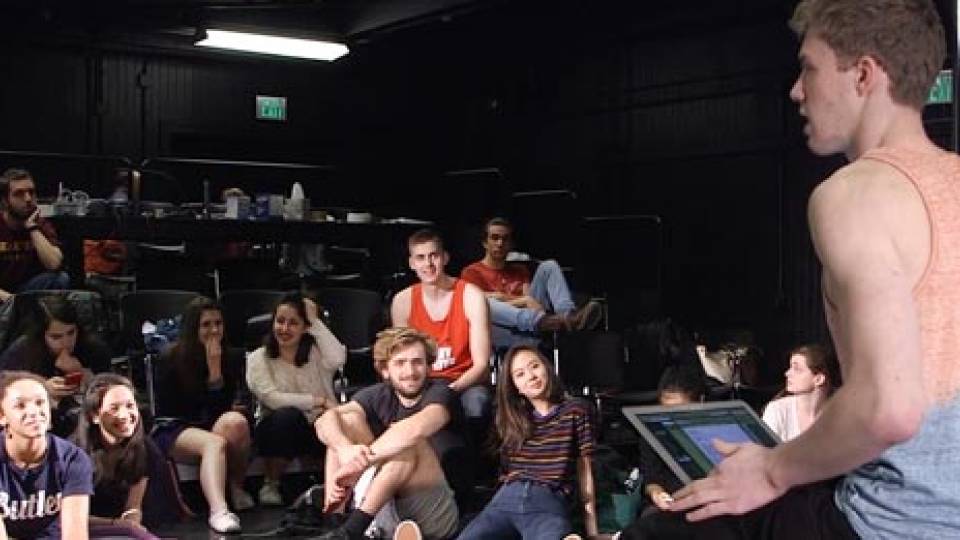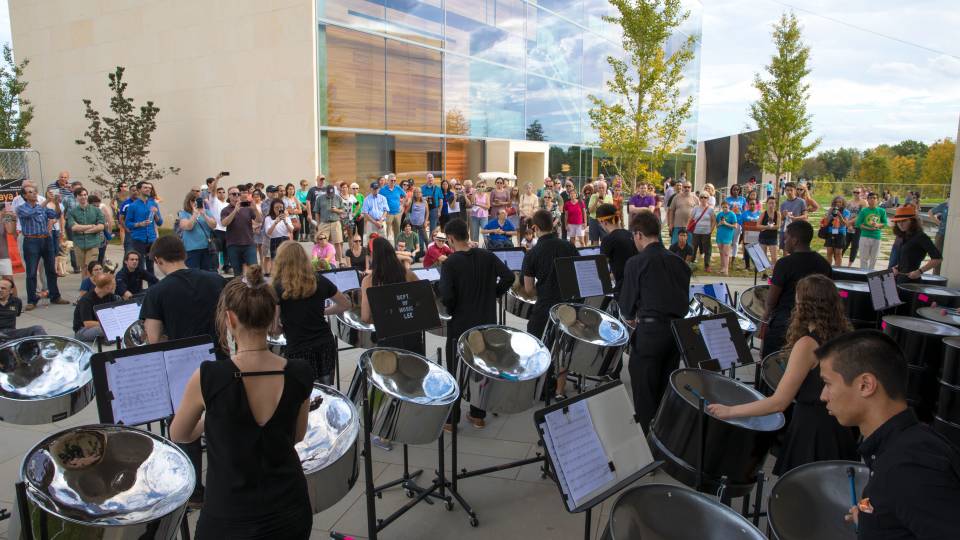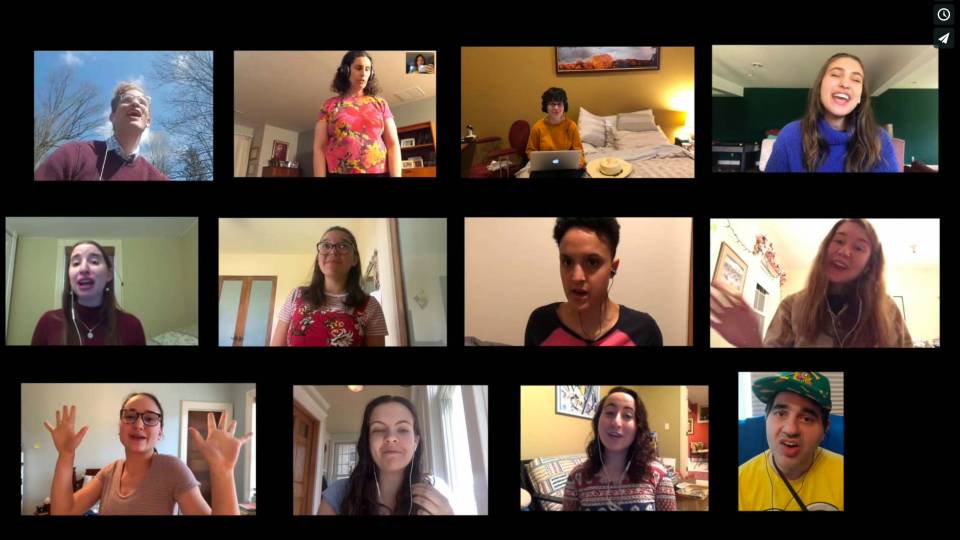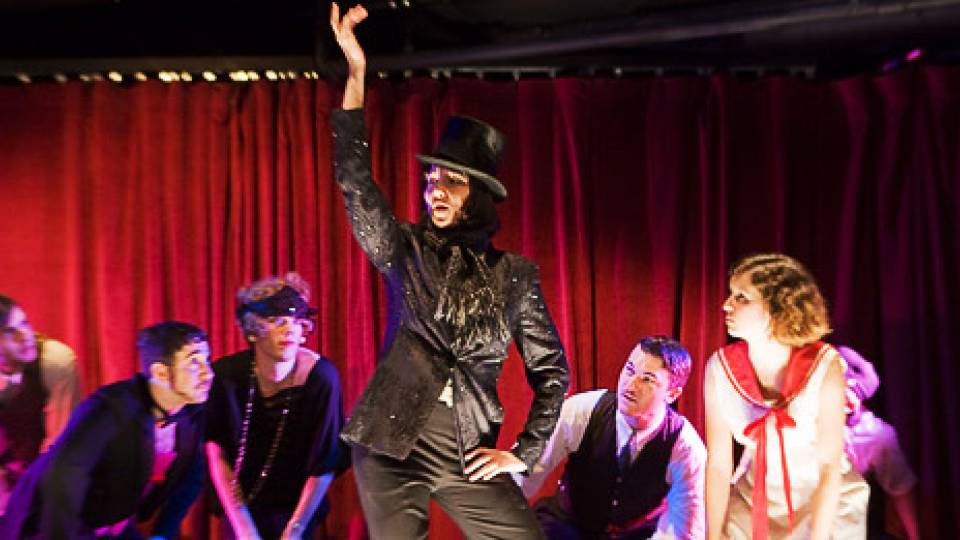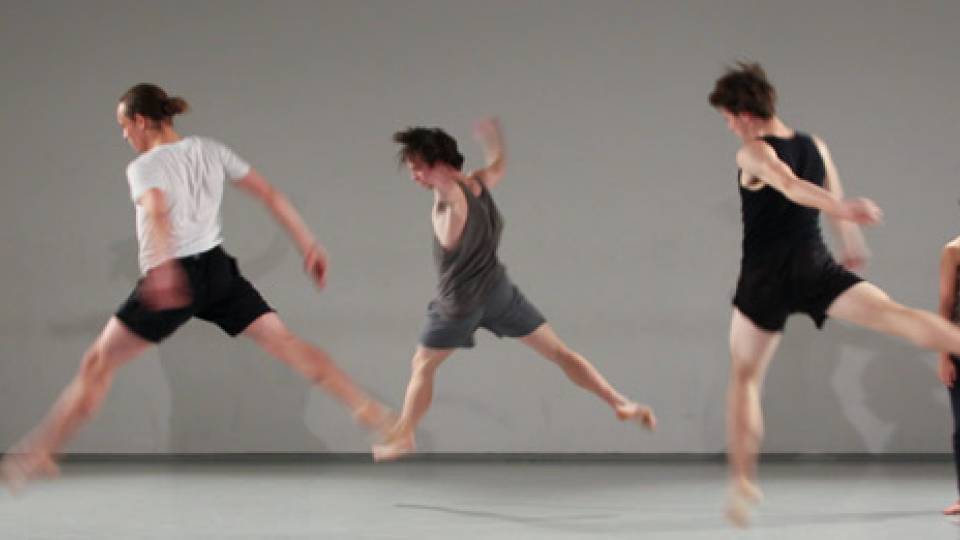Editor's note: This short documentary was reported and produced over a 10-month period during the 2014-15 academic year. Two members of the Office of Communications, videographer and multimedia supervisor Danielle Alio and arts and humanities writer Jamie Saxon, worked closely with the Lewis Center for the Arts and Eamon Foley, who agreed to give us full access to shoot interviews and footage capturing key moments and milestones throughout the year. More than 70 hours of footage, including Foley's video journal, were edited to create the 30-minute film.
From studying the culture of war to creating a theater piece featuring aerial choreography, Eamon Foley's senior year at Princeton allowed him to experiment with and execute many of the ideas that had interested him for years.
Foley earned an anthropology degree and a certificate in theater in spring 2015. Princeton students must write a senior thesis or conduct an independent research project for their major and certificates, and the creation of the thesis is considered a defining achievement in students' academic lives. For his theater thesis, Foley blended his academic studies with his professional experience as a performer to create an original theater-dance piece titled "Hero." The work was performed April 25-May 1 at the Lewis Center for the Arts' Matthews Acting Studio, the Program in Theater's black box theater.
"In my time with the anthropology department, I spent a lot of time studying ethnography — the idea of gathering information through interview — and it kind of reminded me of 'The Laramie Project' [about the 1998 murder of University of Wyoming gay student Matthew Shepard] and all this great theater that's been created from ethnography," Foley said. "I thought this would be a great way to look at where anthropology and theater meet."
"Hero" tells the story of a young man transformed by his experiences in the Vietnam War using indie rock music, dance and aerial choreography. The script is based on Foley's interviews with Vietnam veterans and other research, including his visit to Vietnam in summer 2014.
This video takes viewers through Foley's creative journey during an entire academic year, from early fall 2014 when he had no script, no choreography and no cast — just "a lot of great ideas bouncing around in my head" — through opening night in April 2015. The video highlights many of the practical challenges Foley faced, such as finding a 23-member cast among Princeton's busy students and staying on budget.
In early fall, at the beginning of the process, Foley said, "My greatest fear would be that I couldn't live up to the ideas in my head — that this big visual feast I'm trying to create, this big, intense production, would not reach that intensity I'm holding it to right now."
But on opening night, he found that he had reached the very high bar he had set for himself. He credits the Lewis Center for the Arts for helping him navigate the process, consult with experts and achieve his vision.
"The opportunities that the Lewis Center is giving me are just insane," Foley said.
Foley's theater thesis adviser was Suzanne Agins, a lecturer in theater and the Lewis Center for the Arts who is also a freelance director focusing on new work. In addition, Foley worked with three professional designers on the show: New York-based set designer of theater and live performance Carolyn Mraz; Philadelphia-based lighting designer Thom Weaver, whose work has been seen in professional theaters across the country; and New York-based sound designer M. Florian Staab, who writes music and designs sound for theater, opera, dance and other live performance events, and whose work has been heard in over 100 productions around the United States and internationally.
Live music for "Hero" was performed by Vince di Mura, the resident musical director and composer for the Lewis Center for the Arts and musical director for the show, on keyboards, and an ensemble of five student musicians, four of whom are members of the Princeton University Rock Ensemble, and seven singers.
At 21, Foley is already a Broadway veteran, having appeared in six productions before coming to Princeton. Inspired as a child after seeing a production of "The Nutcracker," he started taking dance classes at the age of 6. He was quickly cast as the prince in a "Nutcracker" production. He also participated in dance competitions, sang with his church choir and did local community theater in his hometown of New Canaan, Connecticut. At age 9, Foley was cast in the 2003 Broadway revival of "Gypsy." Foley's experience with aerial arts began at age 11, when he started training at French Woods Festival of the Performing Arts.
Foley went on to perform in Broadway productions of "Assassins," "Dr. Seuss' How the Grinch Stole Christmas" (twice), "13" and "Everyday Rapture." These experiences — and watching some of the greats such as Tony Award-winners Bernadette Peters and Michael Mayer from backstage — convinced Foley he wanted to make theater as well as perform.
While at Princeton, an interest in creating theater that pushes boundaries and takes risks was Foley's impetus for launching a new student theater group on campus, Grind Arts Company, in 2014. The company's inaugural production was the musical "Sweeney Todd," performed on the loading dock of one of the University's buildings. He has also directed, choreographed and performed with the student theater and dance groups Princeton University Players, BodyHype and Princeton Shakespeare Company, as well as the Lewis Center's productions of "Fuente Ovejuna," "Woyzeck," "The Producers" and the 2014 Spring Dance Festival. He workshopped choreography for "Hero" through BodyHype.
Foley's idea for "Hero" goes back to his teens, when he commuted by train from Connecticut to rehearsals in New York City. He listened to indie rock music, some of which made him think about how a young person might grapple with the experience of war. He knew he wanted to explore this idea in a theatrical work, so he focused his thesis on the topic. In his program notes, Foley saluted the veterans whose experiences formed the genesis of "Hero": "I also must acknowledge the brave and generous veterans who shared their stories with me and inspired this piece. You are all so inspiring and I could never fully grasp what you went through."
Foley said that his senior thesis experience creating "Hero" has given him greater confidence in his abilities and certainty about pursuing a career as a director.
"What I've learned about myself is that I can do this in the real world," he said. "I think I can make theater. And I think that I can make really big, sensory stuff even in places where people say no. I learned that if I keep up that conviction, that don't-take-no-for-an-answer kind of attitude, then I'm going to get the quality that I want. And I think we've gotten the quality that I want."
Foley received an Outstanding Senior Thesis in Theater Award for "Hero" from the Lewis Center for the Arts earlier this month.
Foley has his sights set high for the future of "Hero" and hopes one day to see it produced in New York. Said Foley: "What's on the horizon right now is I want to get this show into the hands of professionals. I want them to see it. I want to hear feedback. I want to work on it. I want to get this show up. I think this show can't end right here and now. I think it has to keep going."
